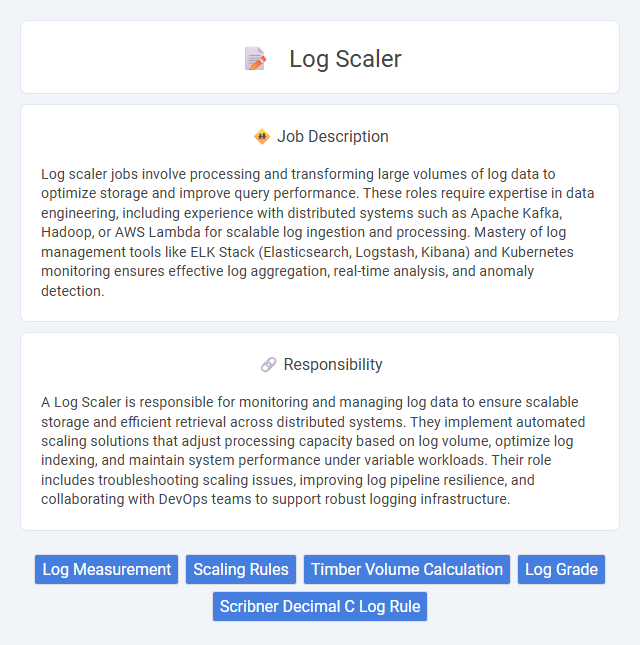
Log scaler jobs involve processing and transforming large volumes of log data to optimize storage and improve query performance. These roles require expertise in data engineering, including experience with distributed systems such as Apache Kafka, Hadoop, or AWS Lambda for scalable log ingestion and processing. Mastery of log management tools like ELK Stack (Elasticsearch, Logstash, Kibana) and Kubernetes monitoring ensures effective log aggregation, real-time analysis, and anomaly detection.
Log scaler jobs likely suit individuals with strong attention to detail and physical stamina, as the role involves measuring, assessing, and recording log dimensions in often outdoor, variable weather conditions. Candidates who are comfortable working independently and handling repetitive tasks may find this job fitting, while those sensitive to prolonged outdoor exposure or lacking physical endurance might find it challenging. The job probably appeals to individuals with an interest in forestry, measurement accuracy, and safety compliance.
Qualification
A Log Scaler must possess strong analytical skills and experience with data logging tools such as ELK Stack, Fluentd, or Splunk. Proficiency in scripting languages like Python or Bash and a solid understanding of cloud platforms (AWS, Azure, GCP) are essential for automating log processing and scaling tasks. Certification in cloud computing or data engineering can significantly enhance qualification credibility in this role.
Responsibility
A Log Scaler is responsible for monitoring and managing log data to ensure scalable storage and efficient retrieval across distributed systems. They implement automated scaling solutions that adjust processing capacity based on log volume, optimize log indexing, and maintain system performance under variable workloads. Their role includes troubleshooting scaling issues, improving log pipeline resilience, and collaborating with DevOps teams to support robust logging infrastructure.
Benefit
Utilizing a log scaler job probably enhances system performance by efficiently managing and reducing log file sizes, which conserves storage space and improves data retrieval speed. It likely minimizes the risk of system slowdowns or crashes caused by log file overflow, ensuring smoother operational continuity. This approach may also simplify log management and analysis, leading to faster troubleshooting and better resource allocation.
Challenge
The log scaler job often faces the challenge of managing vast and continuously growing volumes of log data with limited computational resources. Ensuring real-time processing and accurate scaling without data loss or latency is likely a significant concern. Balancing efficient storage with quick retrieval could also present ongoing difficulties in optimizing system performance.
Career Advancement
Log scaler jobs offer significant opportunities for career advancement by providing hands-on experience in data processing and cloud infrastructure management. Professionals in this role develop critical skills in log analysis, system monitoring, and scalable architecture design, which are highly sought after in the IT and cybersecurity industries. Mastery of log scaler tools and techniques often leads to roles in cloud engineering, DevOps, and data analytics, driving long-term career growth.
Key Terms
Log Measurement
Log scaler jobs primarily analyze core samples to accurately determine the true vertical depth and thickness of geological formations. Precise log measurement enables interpretation of petrophysical properties such as porosity, permeability, and fluid saturation. This process facilitates enhanced reservoir characterization, optimizing drilling and production strategies.
Scaling Rules
Log scaler jobs utilize scaling rules to automatically adjust system resources based on log data patterns and thresholds. These rules analyze metrics such as error rates, request counts, and CPU usage extracted from logs to trigger scaling actions, ensuring optimal performance and cost-efficiency. Properly configured scaling rules help maintain system stability by preventing over-provisioning and under-provisioning during traffic fluctuations.
Timber Volume Calculation
Log scaler jobs involve precise timber volume calculation to determine the commercial value of harvested logs. Using standardized measurement techniques like the Scribner or Doyle log rules, the scaler estimates volume based on log diameter and length. Accurate volume calculation ensures optimal pricing and inventory management in the forestry supply chain.
Log Grade
Log scaler jobs involve analyzing and interpreting well log data to quantify subsurface rock properties. The primary focus is on Log Grade, a critical parameter assessing the quality and consistency of logging measurements, ensuring accurate reservoir characterization. Skilled log scalers enhance data reliability by calibrating log readings and correcting depth mismatches to support precise geological modeling.
Scribner Decimal C Log Rule
The Log Scaler Job applies the Scribner Decimal C Log Rule to adjust log volume measurements, ensuring accurate timber scaling in forestry operations. This method uses a standardized log taper and diameter measurement system to estimate the board footage of logs efficiently. Implementing the Scribner Decimal C Log Rule enhances precision in forest inventory assessments and timber sale calculations.
 kuljobs.com
kuljobs.com